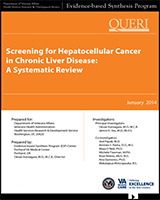Screening for Hepatocellular Cancer in Chronic Liver Disease: A Systematic Review
Evidence-based Synthesis Program
Authors
Investigators: Devan Kansagara, MD, MCR, Joel Papak, MD, Amirala S Pasha, DO, MS, Maya O'Neil, PhD, Michele Freeman, MPH, Rose Relevo, MLIS, MS, Ana Quinones, PhD, Makalapua Motu'apuaka, BS, and Janice H Jou, MD, MHS.Excerpt
In the Veterans Health Administration (VHA), there has been a marked increase in the prevalence of cirrhosis from chronic hepatitis C infection with a corresponding increase in the number of hepatocellular cancer (HCC) diagnoses. From 1996 to 2006, the prevalence of cirrhosis among Veterans with chronic hepatitis C infection rose from 9 to 18.5%, and the prevalence of HCC rose from 0.07 to 1.3%. In the general population, the incidence of HCC rose between 1992 and 2005 from 3.1/100,000 to 5.1/100,000, with localized tumors accounting for most of the increase. While, on average, the 5-year survival of HCC is low (13 to 16.5%), the survival of early-stage disease has risen.
The rationale for screening is that imaging tests such as ultrasound can identify patients with early stage HCC and there are several potentially curative treatment options for patients with early stage HCC including liver transplantation, radiofrequency ablation, and liver resection. Several professional society guidelines currently recommend HCC screening using imaging studies and tumor markers mainly in patients with chronic hepatitis B or liver cirrhosis. However, recommendations for HCC screening remain controversial in part because of concerns over the quality and paucity of existing evidence, and because there have been concerns raised about overdiagnosis and patient harms in other cancer screening programs.
We conducted a systematic review of the published literature to better understand the incremental benefits and harms of routine HCC screening in patients with chronic liver disease compared to clinical or incidental diagnosis. We looked for direct evidence of the health outcome effects of screening. We also looked for indirect evidence of the effects of screening by evaluating studies examining the health outcome benefits and harms of treating early-stage HCC which, because the intent and result of routine screening is detection of early-stage disease, is a proxy for screen-detected disease.
Prepared for: Department of Veterans Affairs, Veterans Health Administration, Health Services Research & Development Service, Washington, DC 20420. Prepared by: Evidence-based Synthesis Program (ESP) Center, Portland VA Medical Center, Portland, OR, Devan Kansagara, M.D., M.C.R., Director.
Suggested citation:
Kansagara D, Papak J, Pasha AS, O'Neil M, Freeman M, Relevo R, Quinones A, Motu'apuaka M, Jou JH. Screening for hepatocellular cancer in chronic liver disease: a systematic review. VA-ESP Project #05-225; 2013.
This report is based on research conducted by the Evidence-based Synthesis Program (ESP) Center located at the Portland VA Medical Center, funded by the Department of Veterans Affairs, Veterans Health Administration, Office of Research and Development, Quality Enhancement Research Initiative. The findings and conclusions in this document are those of the author(s) who are responsible for its contents; the findings and conclusions do not necessarily represent the views of the Department of Veterans Affairs or the United States government. Therefore, no statement in this article should be construed as an official position of the Department of Veterans Affairs. No investigators have any affiliations or financial involvement (e.g., employment, consultancies, honoraria, stock ownership or options, expert testimony, grants or patents received or pending, or royalties) that conflict with material presented in the report.
